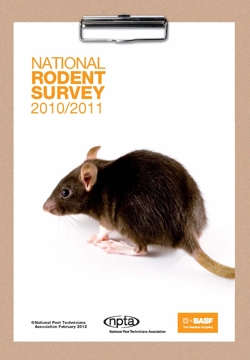Even before their full impact has been felt, national austerity measures are compromising the countrys ability to keep on top of rodent infestations, according to the latest NPTA National Rodent Survey Report published today (March 20).
The annual benchmark survey conducted by the National Pest Technicians Association (NPTA) with BASF Pest Control Solutions reveals a substantial drop in the number of local authorities offering rodent control services in 2010/11. At the same time, it shows another significant annual fall in rat and mouse treatments being undertaken by those councils continuing to do so.
|
“Additional web-based research alongside our latest survey – completed by 243 of the 398 local authorities in the UK – confirms only around 70% are continuing to maintain an in-house rodent control service,” pointed out NPTA chairman, Iain Turner. “This compares with 80% in 2008/9. “More than 10% are now offering no rodent control services whatsoever. And, of those councils still providing them, the proportion charging for rat and mouse control work appears to have increased substantially ahead of the main impact of local government cutbacks. “For instance, over 40% of councils charged for all their rat control in 2010/11 compared to around 30% the previous year. On the other hand, only just over 30% continued to provide all rat treatment free of charge versus nearly 40% in 2009/10 and more than 45% in 2008/9.” Against this background NPTA expresses no surprise that its annual survey indicates total professional local authority treatments in 2010/11 were barely half the level of 2005/6. It stresses that the continued decline in treatments evident over the past four years is far greater than could ever be justified by any change in infestation levels. |
|
|
|
Despite the serious pressures local authority pest control is under, the Association welcomes the fact that the majority of officers do not consider rodents significantly harder to control than in the past. However, it observes that around 60% of rat infestations are now rated as medium or large, and notes that many officers report increasing problems caused by failed DIY treatments and delayed reporting of infestations as a result of charging. “This 12th annual National Rodent Survey Report confirms our previous predictions of the extent to which national austerity measures are reducing treatment levels,” Iain Turner noted with considerable regret. “They are seriously undermining the original concept of local authority responsibility for public health. “Sadly, warnings by the Chartered Institute of Environmental Health and ourselves, amongst others, have gone unheeded. As a result, the well-structured, professionally managed and, above all, free council control services that previously kept rat and mouse infestations at bay are being badly eroded. “Failure to stem this decline will leave enforcement action as the only way of tackling rodent problems in many parts of the country,” he predicted. “As well as proving more costly overall than timely infestation control, this seems certain to allow rodent populations to escalate to an extent that may well pose a serious threat to public health. “We urge all those with the power to intervene to appreciate the seriousness of this situation and take steps to address it before it is too late.” Click on the National Rodent Survey 201/11 to download your copy. |
||


